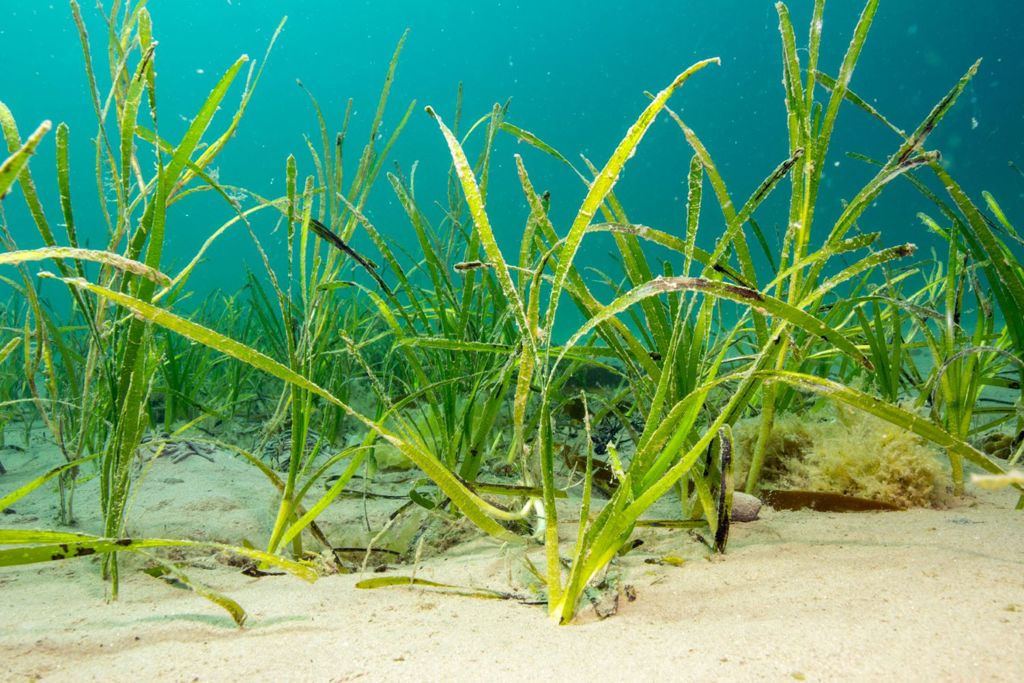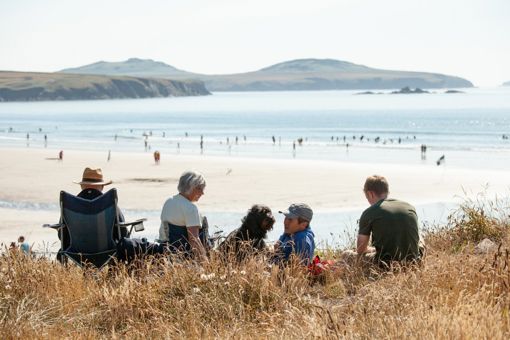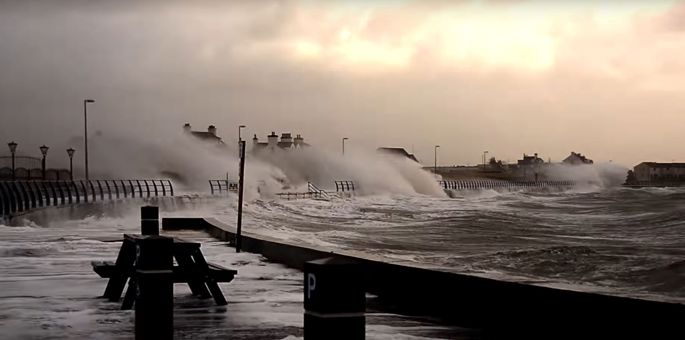Building resilience of marine ecosystems

Image by Paul Kay
Why this theme?
Wales has a rich and diverse marine environment that supports a huge variety of species and habitats. Our seas are home to internationally important populations of marine mammals and birds, fish, seagrass meadows and kelp forests, and a colourful array of invertebrates such as soft corals, lobster and starfish, to name just a few.
The waters around Cardigan Bay are home to the only recognised resident community of bottlenose dolphins in England and Wales, with a population of between 200 and 300. Together with Scotland, Wales holds over 90% of the UK population of Manx shearwaters and over 8% of the world population of northern gannet. Carmarthen Bay is the most important individual wintering site in Britain and Ireland for the common scoter (a sea duck). The importance of this marine wildlife is reflected in the substantial designation of Marine Protected Areas (MPAs) in Welsh inshore waters.
Marine ecosystems that are resilient and rich in biodiversity provide us with many direct and indirect benefits. We rely on our seas as a source of healthy food. Many of our iconic species, such as seals, seabirds and dolphins, are important for tourism and attract thousands of visitors to our coasts every year. Habitats like seagrass meadows and saltmarshes store carbon, in the same way that trees and woodlands do on land. They can also play a role in absorbing wave energy and reducing coastal erosion. Other habitats and species, such as oysters and mussels, filter huge volumes of water and can help to remove waste and improve water quality.
 Image by Paul Kay
Image by Paul Kay
However, the marine environment around Wales is under pressure from a range of impacts such as climate change, unsustainable human activities and the introduction of non-native species. If we want to continue to benefit from our marine ecosystems, it is crucial that we take steps to maintain and enhance them.
Understanding the resilience of our marine ecosystems is incredibly challenging. Marine monitoring and surveys are expensive and there is much we still do not understand about our seas. However, we do collect evidence about the condition of our network of Marine Protected Areas (MPAs). With almost 70% of the Welsh inshore area designated as part of this network, the condition of our MPAs give us a good indication of the health of the wider marine ecosystem. Currently this tells us that whilst many habitats and species are doing well, others are not. What needs to happen to change this?
What would success look like?
Through discussion with our partners, we have focused on a series of specific goals that we want to work together to achieve:
Shared responsibility for improving and sustaining more resilient ecosystems
Whilst we acknowledge that management authorities and public bodies have a major role to play in managing the marine environment, responsibility for marine ecosystem resilience goes beyond these organisations alone.
We know that addressing the issues impacting our marine ecosystems is going to require much wider efforts. In recent years, we have seen a huge willingness from companies and the general public to tackle issues around marine litter. We would like to see this responsibility expand to other known issues affecting marine ecosystems.
Success would include the wider public, industries and all vested stakeholders taking action to address those issues which we know are affecting the health of our MPA network and the wider seas.
 Image by Paul Gibson
Image by Paul Gibson
Improving and applying our understanding of how we can build resilience in the marine environment
In order to build resilience, we first need a better understanding of what resilience actually means in marine ecosystems. We also need an improved understanding of how activities and pressures at sea affect the marine ecosystem. We can then begin to ensure that marine resources are used sustainably.
We think it is important to consider social, economic and cultural resilience, as well as ecosystem resilience. We intend to work with our colleagues developing the land-based Area Statements to address and act upon any shared issues. In particular, we want to improve our understanding of the impacts of climate change on our seas and the contribution that healthy marine ecosystems can have for adapting to climate change.
 Image by Paul Kay
Image by Paul Kay
Targeting resources and effort to address issues where we already have a good awareness of significant impacts on marine ecosystems
Where we have existing evidence of impacts on ecosystem resilience, we want to move quickly to support targeted action. This could include building on existing projects at a national or local scale.
The issues where we have reasonable evidence and agreement on impacts on the marine environment are: climate change; water quality; invasive non-native species and marine litter.
There are other impacts which are known to be an issue but are not well understood. They require us to gather more information before we can work together to develop effective management. These issues include harvesting of commercial and non-commercial marine resources, as well as access and recreation.
 Image provided by the Skomer Marine Conservation Zone team
Image provided by the Skomer Marine Conservation Zone team
Effective and consistent management of the Marine Protected Area (MPA) network to support ecosystem resilience of the wider marine environment
We hope the Marine Area Statement can support the achievement of the long-term vision for the Welsh MPA network. This vision guided Welsh Government’s MPA Network Management Framework and Action Plan and is the approach for improving the management of all current and future MPAs. The vision is:
“The Welsh MPA network is under effective and consistent management which safeguards the marine wildlife and habitats of sites and leads to site features achieving or maintaining favourable condition. Network management supports resilient marine ecosystems which in turn help to achieve clean, safe, healthy, sustainable, productive and biologically diverse Welsh seas. MPAs are valued for the long-term benefits they provide to the people of Wales through the protection of their rich natural and cultural heritage”
While many features of the MPA network are in favourable condition, we have good evidence that some of our protected features are not. Where the reason for failing is understood, action can be taken to improve their condition. However, for some features we need more evidence to be confident in our assessments.
There are a number of priority work areas which have been identified within the MPA network as requiring targeted action. These are:
- Water pollution and marine litter
- Coastal squeeze & flood and coastal erosion risk management
- Access and recreation
- Land management
- Marine invasive non-native species
- Marine fisheries
A Marine Protected Area (MPA) network that is ecologically coherent and supports ecosystem resilience
An ecologically coherent network refers to all of the MPAs being planned and managed as a whole to deliver benefits more effectively than a single site can alone. We believe that a well-managed and ecologically coherent network is a key tool in supporting the resilience of the wider marine environment. The current MPA network is not yet finalised but work is underway to complete it. We will continue to support the Welsh Government to ensure that this remains a priority. This Area Statement will seek to further our understanding of how the network contributes to building resilience across Welsh seas.

Image by Paul Kay
Who have we worked with to date?
Natural Resources Wales hosted a workshop to collaborate on identifying the goals for this theme, and the actions that were required to get us there. We invited a variety of partners and stakeholders with interests in marine biodiversity and ecosystem resilience.
The team of marine specialists at Natural Resources Wales were also engaged extensively throughout the development of this theme. Many of these colleagues are directly involved in developing and managing the Marine Protected Area network and sit on the various associated groups as well.
We will engage with the recently-formed Wales Marine Action and Advisory Group Resilience sub-group. This group was set up by the Welsh Government in order to respond to the growing policies and issues relating to marine ecosystem resilience. The members of this group come from a range of backgrounds and expertise and include those that attended our workshop. They will be fundamental to helping to develop and deliver the actions we have identified.
As we continue to develop this work we also want to engage with a wider range of stakeholders, including local communities. We believe this is fundamental in ensuring there is a shared sense of responsibility for the resilience of Welsh seas.
What are the next steps?
Through our internal and external engagement, we identified the actions below as necessary to help us achieve our goals. These actions may be led by Natural Resources Wales, the Welsh Government, Marine Protected Area (MPA) Management Authorities or others. In identifying these actions we have assumed that resources will be available, but we acknowledge that this may remain challenging.
To create a shared responsibility for improving and sustaining more resilient marine ecosystems:
- Targeted engagement and events to promote a shared responsibility among marine sectors (those managing and using the marine environment) for supporting marine ecosystem resilience
To improve and apply our understanding of how we can build resilience in the marine environment:
- Conduct a stocktake of current work programmes and research on marine ecosystem resilience in order to make existing knowledge more accessible and underpin additional research on marine resilience
- Commission research to better understand marine ecosystem resilience
- Undertake research to understand the impacts of climate change on the resilience of marine ecosystems and the contribution that a resilient marine ecosystem can make to climate change adaptation
- Natural Resources Wales to deliver the assessment component of the Assessing Welsh Fishing Activities project to understand interactions between features and gear types
To target resources and efforts where we already have a good awareness of significant impacts on marine ecosystems (and resilience) and the opportunities to address them:
- Support Welsh Government delivery of Assessing Welsh Fishing Activities management outputs
- Natural Resources Wales and Welsh Government to refocus funding processes and criteria to directly encourage projects with a clear, demonstrable contribution to resilience
- Successful case studies of management activities are required to share with MPA management authorities
- Support work within opportunity catchments which have been identified to improve the quality of estuarine and coastal waters
To ensure the effective and consistent management of the MPA network so that it can support ecosystem resilience of the wider marine environment:
- Identify and prioritise MPA management action based on sensitivity of features to known impacts on condition
- Implement the MPA Network Management Action Plan and amend assessment of proposed actions to include contribution to resilience
- Working with MPA Management Authorities to refine the process of identifying local prioritised actions that deliver marine ecosystem resilience, considering barriers and opportunities for delivery
- Design and implement a new process for assessing MPA site condition that includes prioritised investigation of unfavourable condition
To achieve a MPA network that is ecologically coherent and which supports ecosystem resilience:
- Support Welsh Government with the delivery of the MPA network completion project to ensure the Welsh MPA network is ecologically coherent
- Consider the need for modifications or adaptive approaches to the MPA network in light of climate change and other large-scale, long-term pressures
 Image by Paul Kay
Image by Paul Kay
How does what we’ve proposed deliver Sustainable Management of Natural Resources (SMNR)?
Work under this theme is focused on building the resilience of marine ecosystems, but in light of the limited understanding of marine resilience, our initial actions are intended to improve the evidence base through the commissioning of research.
We have worked internally and externally through collaborative engagement to identify the goals and actions that will move us towards a better understanding of marine resilience and measures for achieving it.
By using the Marine Protected Area (MPA) network as a best available indication of the resilience of the marine ecosystem, we are tackling issues at the appropriate scale. Working with MPA management authorities to identify, implement and encourage new actions could result in adaptive management that can deliver multiple benefits over the long-term.
Through exploring the links between this theme and marine resilience in the context of the Welsh National Marine Plan, we can contribute to the marine planning process as a way of taking strategic and preventative action to sustainably manage marine natural resources.
We want to encourage a shared responsibility and drive public participation in achieving resilient marine ecosystems.
 Image by Paul Kay
Image by Paul Kay
Maps of the area
Please note that our maps are not accessible for people using screen readers and other assistive technology. If you need this information in an accessible format, please contact us.
Protected areas Marine Area (PDF)
How can people get involved?
This theme is only the beginning of the journey as we work with people in Wales to improve the management of our coasts and seas. If you would like to be part of this process, please get in touch with us. You can also email us direct at: marine.as@cyfoethnaturiolcymru.gov.uk
Give us your feedback




